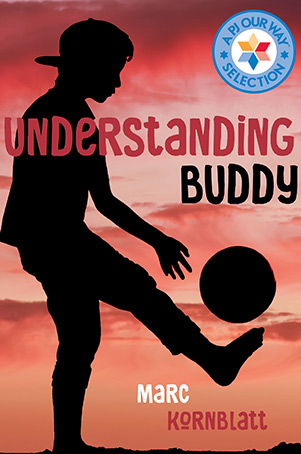Understanding Buddy
Average Rating
What the Book is About
Ten-year-old Sam isn’t supposed to know that their family’s house cleaner has died in a car accident, and keeping the secret makes things hard for him at school. He can't tell anyone why the new boy – Laura's son – acts so strangely, so nobody understands why Sam sticks up for Buddy when the other boys tease him. Least of all, Sam's best friend, Alex.
Jewish Content & Values
- Sam's Hebrew School lessons feature ethical and moral debates that tie the week's Torah portion to the problems Sam is having at home.
- Sam treats Buddy with compassion (rachamim) and kindness (chesed) even when the other boys tease him.
Positive Role Models
- Sam does the right thing and sticks by Buddy even when the other boys, including his best friend, Alex, make it very difficult.
- Mr. Nadler, Sam’s bar mitzvah teacher, facilitates discussions about moral issues and encourages the children to reach their own conclusions.
Content Advisory
- Buddy’s mother dies in a car accident. She is only in the book very briefly, and her death is discussed matter-of-factly and without descriptive detail, so most readers are unlikely to find this unduly disturbing.
- The boys find Buddy strange. Some of the boys bully Buddy, saying that he belongs in special ed. They then turn on Sam when he defends Buddy. The boys’ behavior may make some readers feel uncomfortable; the author’s intention is to make their cruelty realistic so that readers disapprove of it.
Talk it Over!
More for You
Throughout Understanding Buddy, Sam embodies the concept of rachamim, the Biblical Hebrew word for “compassion”. Compassion is one of the most significant of Jewish values. Rachamim has the same root as “rechem,” the word for womb, so some scholars have suggested that the word originally meant “brotherhood” (denoting people born from the same womb). Yet Judaism says that it is not just close family and friends who should be treated with compassion: in Exodus we read “You shall not mistreat any widow or fatherless child,” and also “You shall not wrong a stranger or oppress him”. Animals, too, must be treated with compassion. A midrash (commentary on the bible) says that Moses was chosen to lead the people of Israel because of his compassion for a single sheep in his herd.
What the Book is About
Ten-year-old Sam isn’t supposed to know that their family’s house cleaner has died in a car accident, and keeping the secret makes things hard for him at school. He can't tell anyone why the new boy – Laura's son – acts so strangely, so nobody understands why Sam sticks up for Buddy when the other boys tease him. Least of all, Sam's best friend, Alex.
Jewish Content & Values
- Sam's Hebrew School lessons feature ethical and moral debates that tie the week's Torah portion to the problems Sam is having at home.
- Sam treats Buddy with compassion (rachamim) and kindness (chesed) even when the other boys tease him.
Positive Role Models
- Sam does the right thing and sticks by Buddy even when the other boys, including his best friend, Alex, make it very difficult.
- Mr. Nadler, Sam’s bar mitzvah teacher, facilitates discussions about moral issues and encourages the children to reach their own conclusions.
Content Advisory
- Buddy’s mother dies in a car accident. She is only in the book very briefly, and her death is discussed matter-of-factly and without descriptive detail, so most readers are unlikely to find this unduly disturbing.
- The boys find Buddy strange. Some of the boys bully Buddy, saying that he belongs in special ed. They then turn on Sam when he defends Buddy. The boys’ behavior may make some readers feel uncomfortable; the author’s intention is to make their cruelty realistic so that readers disapprove of it.
Talk it Over!
More for You
Throughout Understanding Buddy, Sam embodies the concept of rachamim, the Biblical Hebrew word for “compassion”. Compassion is one of the most significant of Jewish values. Rachamim has the same root as “rechem,” the word for womb, so some scholars have suggested that the word originally meant “brotherhood” (denoting people born from the same womb). Yet Judaism says that it is not just close family and friends who should be treated with compassion: in Exodus we read “You shall not mistreat any widow or fatherless child,” and also “You shall not wrong a stranger or oppress him”. Animals, too, must be treated with compassion. A midrash (commentary on the bible) says that Moses was chosen to lead the people of Israel because of his compassion for a single sheep in his herd.

